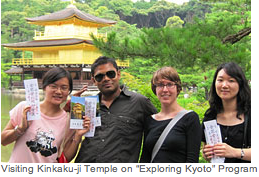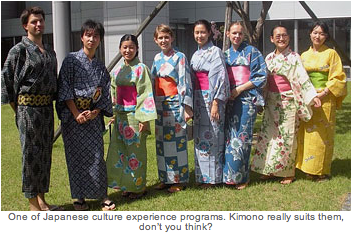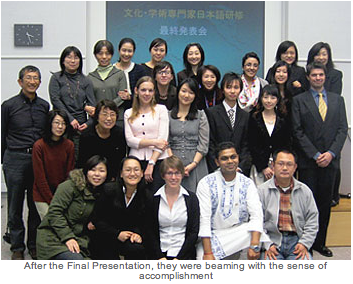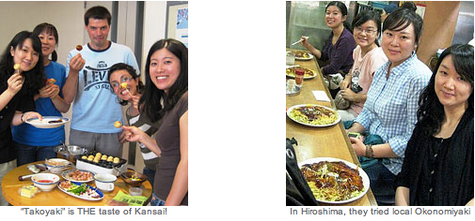Activity Reports:Japanese-Language Education Overseas:Comments from the Participants of Japanese-Language Program for Specialists in Cultural and Academic Fields
The Japanese-Language Institute, Kansai
The Japan Foundation Japanese-Language Institute, Kansai provides "Japanese-Language Program for Specialists in Cultural and Academic Fields." This program for Japanese studies Researchers, postgraduate students, librarians, and museum curators has two-month and six-month courses.
Participants of six-month course in FY2009 completed their program and returned to their countries in December 2009. The following members gave us feedback on the program: Anna TRZASKA (Poland), Julio César ABAD VIDAL (Spain), and Mercè ARDIACA JOVÉ (Spain / resident in Germany). Interviews with other members are also included. Let's have a look.
[Feedback]
<Daily life at the Institute>
 The Institute has many advantages. The Institute's library, for instance, may be rather small in its scale but is one of the best libraries in Japan. It maintains a plenty of documents, and librarians assist users who are not fluent in Japanese by introducing materials that will be useful in their researches and interests or by helping them to search such materials. The Institute has an athletic room and rents out bicycles, so participants can enjoy a variety of sports. A self-service kitchen is available for those who want to cook.
The Institute has many advantages. The Institute's library, for instance, may be rather small in its scale but is one of the best libraries in Japan. It maintains a plenty of documents, and librarians assist users who are not fluent in Japanese by introducing materials that will be useful in their researches and interests or by helping them to search such materials. The Institute has an athletic room and rents out bicycles, so participants can enjoy a variety of sports. A self-service kitchen is available for those who want to cook.
The Institute has a friendly atmosphere. In particular, the reception desk staffs are very kind when we need help, contributing to a warm and relax atmosphere.
<Training Program>
The Japan Foundation Japanese-Language Institute, Kansai supports participants in both Japanese-language education and in research activities. Teachers show their commitment to teaching in the program. Participants can select subjects to learn depending on their interests or weakness in Japanese-language proficiency. One-on-one lessons benefit them in reading documents with instructors that are otherwise beyond their comprehension.
In addition to Japanese-language lessons, the program offers opportunities to experience traditional cultures. There are also many occasions to communicate with local Japanese residents, so participants can join the programs such as Japanese-language conversation partnership, home visits, and elementary school visits.
* Comments from Se Eun CHA (Korea), librarian:
Very useful skills I learned as a librarian at this program are as follows:
1. Capability to collect documents and search for information
I learned how to search for and collect the information on documents in foreign languages.
2. Research on the reference service for Japanese users
I made a research on reference services by interviewing with librarians and researchers as well as by visiting the National Diet Library and public libraries.
3. In-depth knowledge on Japanese laws and ordinances
My research thesis is the research method of information on Japanese laws and ordinances. During my field research period, I visited the Diet to make a research on the role, activities, and legislative process of the Diet.

* Comments from You Rim LEE (Korea), curator
The intensive research period for my expertise was really fruitful. By visiting exhibitions at various museums, I learned the exhibition methods that varied depending on the subjects and exhibition techniques that were different from those employed in Korea. In addition, I could observe the current education on museum exhibitions in Japan by using exhibition records, worksheets, and quizzes made by museums. These activities enhanced my vocabulary on my field of profession and art history.

We are glad to hear that they enjoyed their days at the Institute. We are looking forward to seeing people from across the world who have keen interest in Japan.
Related Articles
Back Issues
- 2024.3. 4 Movie Theaters aroun…
- 2023.4.10 The 49th Japan Found…
- 2023.3.28 JF's Initiatives for…
- 2023.1.27 Living Together with…
- 2022.11.16 Inner Diversity <…
- 2022.6.21 The 48th Japan Found…
- 2022.3.22 JF's Initiatives for…
- 2022.3.14 JF's Initiatives for…
- 2022.2.14 JF's Initiatives for…
- 2022.2. 4 JF's Initiatives for…


